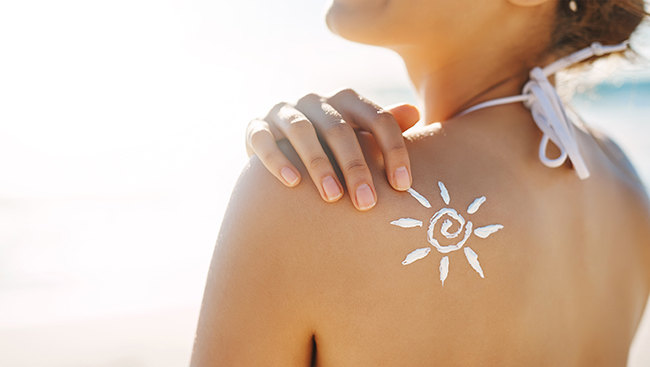Clear skies and warmer temperatures have us migrating to restaurant patios, the beach and beyond. When heading out, whether for a short jog or a long bike ride, it’s advisable to apply sunscreen beforehand, not only for immediate protection from sunburn but also for the long-term benefits of protecting you from premature aging, hyper pigmentation and, potentially, skin cancer.
One way to remember to always wear sunscreen is to simply integrate it into your skincare routine which it really should be a part of it year-round—yes, even in winter.
“UVA rays continue to be strong even in the wintertime, they can penetrate clouds and window glass. Don't
forget that sunlight is reflective, too,” Nour Dayeh, Media Communications Manager at La Roche-Posay Canada.
“Sunlight reflects off the water, sand and even bounces off snow. If you're spending time in a lake, at the beach or enjoying winter sports, you're at increased risk of sun damage, even when it's cloudy outside. Getting into the habit of putting sunscreen on every morning, just like brushing your teeth is essential to protect your skin from photoaging and skin cancer.”
Hilary Lloyd, Vice President of Brand & Values for The Body Shop North America, concurs that it’s important to wear sunscreen year-round. “UV radiation can overpower the skin's ability to protect itself, causing damage to the structure and function of the skin cells,” she explains.
Choosing the right sunscreen comes down to more than just a personal preference and several factors can determine how you make the right choice. “If you are planning to do an activity where you will sweat or be in the water, look for a sunscreen that is sweat and water resistant,” Dayeh advises. She points to La Roche-Posay’s Anthelios Ultra-Fluid Lotion SPF50+ which is 80-minutes water and sweat resistant and created for those with an active lifestyle.

Matching your skin type to the right type of sunscreen is another consideration. Lloyd suggests that oily and combination skin types should look for “sunscreens that are labelled ‘oil-free,’ lightweight [and] have a matte finish. Whereas a dry skin type may choose sunscreens that contain hydrating ingredients such as hyaluronic acid or glycerin. Sensitive skin may opt for sunscreens that do not contain fragrance.”
Just as there are various options for specific skin types, there is a difference between sunscreens for the face and for the body with unique formulas created to address those areas’ different needs.
“The skin on your body can react differently to ingredients than the skin on your face,” Lloyd says. “It’s the same reason why we don’t usually use body moisturizers on our face, or facial washes on our bodies. The skin on the face may be more sensitive than the skin on the body, have overactive sebaceous glands that can lead to clogged pores, development of blackheads and various forms of acne.”
Shop for your skin type, Dayeh advises. Those with sensitive skin should look for dermatologist-approved products.

People with dry skins should opt for non-greasy hydrating creams that are easily absorbed, while those with oily and acne-prone complexions are better off with a gel-cream like La Roche Posay’s Dry Touch. This cream, Dayeh says,
“contains Airlicium™ – an exclusive anti-sweat molecule that absorbs up to 150 times its volume in sebum.”
Whatever your skin type, to avoid breakouts, check the label to make sure the product is non-comedogenic.
For a body sunscreen, think about the feel, finish and application method—a light spray works for normal skin and an oil can be beneficial for dryer skin.
“While all sunscreens should be reapplied every two hours, if you’re swimming or exercising, make sure you reapply as soon as you dry off to maintain your level of protection,” Dayeh says.
Be sure to protect lips, ears and hairline. That’s where a solid stick SPF can come in handy which is convenient to keep in your purse to for reapplication—small and no risk of messy leaks.

Just as we’ve seen product innovation reflected in improvement in texture, protection time and application methods, it’s also evident in the integration of SPF into skincare products. For example, skincare brand Kiehl’s’, which believes the key to strengthening skin’s lipid barrier is by minimizing moisture loss and sun damage, has created a multi-benefit SPF product range that includes the Ultra Facial Cream with SPF, Powerful Wrinkle Reducing Cream, Super Multi-Corrective Cream and Skin Tone Correcting and Beautifying BB Cream.
“In order to protect the skin, we have made it possible to have a 2-in-1 formulation where there is sun protection, as well as hydration, providing overall benefits to the skin barrier,” the Kiehl’s Education Team said in an email statement referencing the Ultra Facial Cream as an example.
The Body Shop has a Vitamin C cream for brightening the complexion with the added benefit of SPF 30 protection. La Roche Posay’s Anthelios Mineral One SPF50+ combines sun protection, ultra-hydration thanks to hyaluronic acid in a tinted moisturizer available in five shades.
Multi-purpose products or your regular skincare products along with sunscreen can be layered to give skin the best protection. The Kiehl’s team advises “to apply the lightest formulas first, which would typically be a serum, to allow for the smallest molecules to penetrate deeper into the skin. Following the serum, we advise the moisturizer be applied, followed by the sunscreen.”
Whether your skincare routine is multi-stepped or minimal, sunscreen is easy to add to it. Hello sunshine.
